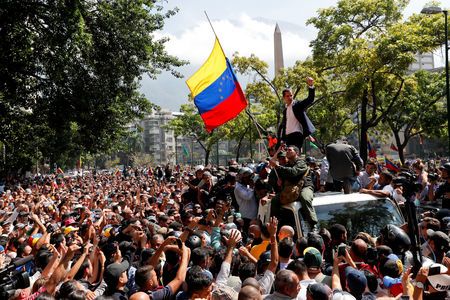CARACAS, (Reuters) – Thousands of marchers protested in Venezuela today to try to force socialist President Nicolas Maduro from power as tension grew between Russia and the United States over the political standoff in the OPEC-member nation.
Opposition leader Juan Guaido had called for the “largest march” in Venezuela’s history and on Tuesday asked the military for their backing, but the armed forces leadership has so far remained loyal to Maduro, who has been in power since 2013.
“If the regime thought we had reached maximum pressure, they cannot even imagine,” Guaido told thousands of cheering supporters in eastern Caracas, the capital. “We have to remain in the streets.”
Under a scorching sun, supporters banged drums and carried Venezuelan flags and banners proclaiming “freedom.” At a different site in Caracas some protesters, their faces covered in shirts, threw projectiles from an overpass at National Guard officers below, who responded by firing tear gas canisters.
The Venezuelan opposition has often staged huge street protests against Maduro but has failed to dislodge him despite deep economic recession and hyperinflation.
Guaido – who heads the opposition-run National Assembly – is recognized as Venezuela’s legitimate president by the United States, Europe and others, but Maduro is backed by countries including Russia, China, and Cuba.
The fault lines are increasingly putting Venezuela at the heart of global geopolitical tensions, with the United States and Russia accusing each other of intervention in Venezuela’s affairs.
U.S. President Donald Trump’s administration has imposed sanctions on the Maduro government and refused to rule out military intervention, although it says it prefers a peaceful transition.
“Military action is possible. If that’s what’s required, that’s what the United States will do,” U.S. Secretary of State Mike Pompeo told Fox Business Network.
The Pentagon appeared to downplay any active preparations to directly intervene in Venezuela, but acknowledged detailed contingency planning.
Russian Foreign Minister Sergei Lavrov told Pompeo by phone on Wednesday that further “aggressive steps” in Venezuela would be fraught with the gravest consequences, Russia’s Foreign Ministry said.
Lavrov also condemned U.S. “interference” in Venezuela’s internal affairs as a breach of international law.
In turn, the United States has also accused Moscow of interfering in the South American country, an ally of Russia since the time of Maduro’s predecessor and mentor, the late President Hugo Chavez.
Pompeo said on Tuesday that Maduro had recently been prepared to leave Venezuela but changed his plan after Russia intervened. A spokeswoman for Russia’s foreign ministry denied that.
White House national security adviser John Bolton, a foreign policy hawk, said Moscow’s interference was not welcome.
“This is our hemisphere,” he told reporters outside the White House. “It’s not where the Russians ought to be interfering. This is a mistake on their part. It’s not going to lead to an improvement of relations.”
Maduro retains control of state institutions and the loyalty of the armed forces, frustrating Guaido’s bid to assume the day-to-day functions of government on an interim basis – which he says would be a prelude to calling new elections.
Guaido faces a challenge to maintain momentum, amid frustration among some supporters that Maduro remains in office more than three months after the opposition leader invoked the constitution to assume an interim presidency, arguing that Maduro’s 2018 re-election was illegitimate.
Seeking to appeal to Maduro’s traditional base among the working class, Guaido said on Wednesday in Caracas he would consider a proposal from public workers to call for a series of stoppages leading up to a general strike.
Carlos Alberto, a 70-year-old small-business owner, draped in a Venezuelan flag, said: “We are tired of this regime, that has brutally impoverished us. My children and almost all my family have already left Venezuela. … We know that if it’s not today, it will be tomorrow, because this has to end.”
Venezuelan living standards have declined even further in the first several months of the year, with blackouts and water shortages adding to hyperinflation and chronic shortages of food and medicine that have prompted millions to emigrate.
Triple the usual daily number of Venezuelans fled across the border to Brazil on Tuesday, Brazilian government data showed.

Maduro, who says Guaido is a puppet of the United States seeking to orchestrate a coup, called a march of his own supporters on Wednesday.
“We have been confronting different types of aggression and attempted coups never before seen in our history,” he said on Tuesday.
Several thousand Maduro supporters, wearing red shirts, headed toward the Miraflores presidential palace.
Educator Mercedes Martinez called Guaido a “lapdog” and said: “The empire wants to smother us, cut off our head and colonize us. … The people of Venezuela are defending Venezuela.”
Elsewhere in Latin America, millions of Cubans took to the streets to protest new sanctions imposed on the Caribbean island by the Trump administration and U.S. efforts to topple Maduro.

